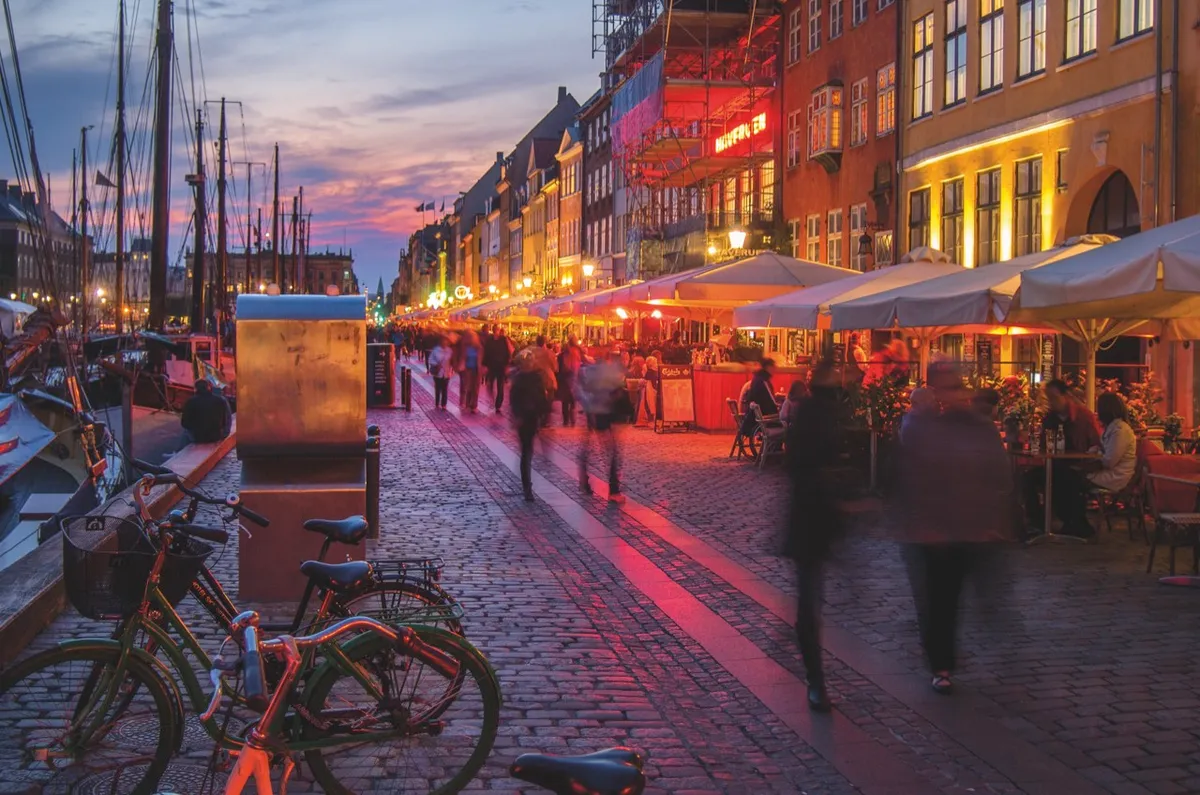Many people would find long dark night and bitter cold pretty depressing. But not most Danes. In 2016, Denmark was ranked as the happiest nation on the planet in the World Happiness Report. This might sound surprising given that in mid-winter the country is plunged into darkness for 16 hours a day, deprived of that supposed vital ingredient of happiness: sunshine. So what are their secrets?
The annual World Happiness Report typically assesses criteria such as: per capita income; life expectancy; people’s freedom to make life decisions; generosity; social support; and corruption in government and business. For the 2017 report - in which Norway leapfrogged their Scandinavian neighbours into first place - researchers looked in depth at Africa and China, happiness in the workplace, happiness over the course of life in general, and the sources and consequences of trust – the vital glue for ensuring stable social foundations.
“The most surprising thing we’ve found is that building the positives is more important than identifying and curing the negatives,” says John Helliwell, professor emeritus of economics at the University of British Columbia, who co-edits the World Happiness Report. “The aim of the report is to increase public and policy awareness of the importance and meaning of internationally comparable measures of the quality of life,” he adds.

Helliwell and his colleagues believe that happiness provides a better indicator of human welfare than separate measures of income, poverty, education, health and good government. And they have found that people are happier living in societies where there is less happiness inequality. However, results show that happiness inequality has increased significantly in most countries, in almost all global regions, and for the population of the world as a whole.
Does money buy happiness?
It’s not surprising to learn that wealth does play a small part in happiness. After all, incomes are more than 25 times higher in the happiest countries than in the least happy ones. “Income is one of the bigger elements in explaining international differences,” says Helliwell. “Having at least sufficient material resources is one of the prime supports for a good life. But, of course, they are not the major part of the story.”
Meik Wiking, CEO of the Happiness Research Institute, a Copenhagen-based think tank, agrees that money is not the sole root of happiness: “The Danes decouple wealth and well-being. We focus on the small things that really matter, including spending more quality time with friends and family, and enjoying the good things in life.”
Wiking is the author of The Little Book Of Hygge: The Danish Way To Live Well. Hygge (pronounced ‘hooga’) is the latest buzzword on the lips of every advertising agent, lifestyle magazine editor and blogger. It is usually translated as ‘cosiness’, but Danes would say it’s much more than that.
“Hygge has been called everything from the ‘art of creating intimacy’ to ‘cocoa by candlelight’,” says Wiking. “Some of the key ingredients are togetherness, relaxation, indulgence, presence and comfort. The true essence of hygge is the pursuit of everyday happiness and it’s basically like a hug, just without the physical touch.”

Now, before you start thinking that all you need to be truly happy is to win the lottery so that you can settle down in a blissful state of hygge and never lift another finger, think again. Even if you’re wealthy, work is a great tonic for gloominess.
“It is not work itself, but how it is done, with whom, and in what circumstances, that creates or destroys happiness,” says Helliwell. “People are happier doing things with other people, especially if they feel they’re doing important things in a friendly and trustworthy environment. This is true for life both in and out of the workplace. People who work in a high-trust workplace and think of their superior more as a partner than a boss are as happy on weekdays as on weekends.”
And there we were feeling miserable about the decades of hard toil that stretch ahead of us…
Subjective smiles
So, the next big question: can one really rate happiness subjectively? Surely, surveys are subject to individual bias? We all know how we Brits like to put a brave face on, picnic on a rainswept beach (just because the Met Office told us it was going to be a scorcher), and always say ‘Fine, thanks!’ when someone asks us how we are (even if we’re going through a crushing bout of existential angst, having spilt our cup of tea).
“There are three different types of subjective well-being measures,” explains Helliwell. “These include positive affect [how we experience positive emotions], negative affect [how we experience negative emotions], and life evaluations, where respondents say how happy they are with their lives as a whole.” According to Helliwell, life evaluations tend to be determined by individual circumstances and are more variable among countries. All three measures are subjective reports based on the individual’s responses – just like when doctors ask patients to report on their pain levels.
Yet not all scientists are satisfied with these subjective assumptions. Associate professor Wataru Sato and his team at Japan’s Kyoto University have used scans of the brain to try to determine which area is involved in feeling happy. Their results showed that volunteers who rated highly on happiness surveys had more grey matter mass in the precuneus, which is involved in self-reflection and consciousness.
But scientists aren’t just looking at the brain. They are also turning to genetics to determine why some of us are happier than others.
In the genes
Researchers at Vrije Universiteit in Amsterdam have isolated the parts of the human genome that may explain the differences in how we each experience happiness. After analysing the DNA of over 298,000 people from around the world, the team found three genetic variants for happiness. Crucially, they discovered that two of the variants are linked with differences in the symptoms of depression, a mental disorder that is one of the greatest medical challenges of our time.
“The genetic variants that influence subjective well-being largely overlap with those that explain differences in depressive symptoms,” says Prof Meike Bartels, who carried out the research. According to Bartels, this overlap indicates that it could be useful to promote well-being in conjunction with preventing and treating mental illness. So it seems that taking steps to keep your population happy is just as important as safeguarding them from mental illness.
Meanwhile, a paper published in the Journal Of Happiness Studies suggests that the DNA of people who regard themselves as happy is more likely to contain a specific gene variant involved in sensory pleasure and pain reduction.
Elsewhere, research at the University of Warwick has shown that national levels of happiness depend on how close we are genetically to our smiley friends, the Danes.
“Our research showed that the ‘genetic distance’ of a country from Denmark correlates with the average life satisfaction in that country,” says Proto.
Intriguingly, the research also showed a link between mental state and the version of the gene that influences the uptake of serotonin. The serotonin transporter gene comes in two forms: long or short. According to the research, the short variation, which some scientists consider to be linked to depression, is more common in countries that report lower average levels of life satisfaction. While the link is controversial, the short variation has also been associated with higher scores on neuroticism and lower life satisfaction. Denmark and the Netherlands appear to have the lowest percentage of people with this short variation.
Happiness is law
The great news is that we British are not too far removed genetically from our Nordic cousins across the sea. “The British have no excuse – they are sufficiently close to the Danish in terms of genetic distance,” says Proto, adding jokingly: “Although weather is also an important determinant of subjective well-being!”
Back in 2010, David Cameron commissioned a study into the happiness of the British and, according to the government, happiness rates are on the rise in the UK. Politicians have latched on to the importance of happy citizens. Ministers of happiness have been appointed in Ecuador, the United Arab Emirates, Venezuela and Bhutan. In the latter, happiness is now embedded in the national constitution. And the National Academy of Sciences in the US has formed a panel to establish how happiness measurements can help develop policy.
So, is the world becoming a happier place? “There’s not much of a global trend yet,” says Helliwell. “Data is only starting to become available for a long enough period to find significant trends among nations. Over the very long term, even if lives in less happy countries are becoming better, we might expect to see that for the world as a whole there may be some adjustment in expectations as people raise their sights and see even better potential lives.”
Maybe it would do us all good to bear in mind the wise words of one of the Founding Fathers of the US, Benjamin Franklin, who said: “Happiness consists more in small conveniences of pleasures that occur every day than in great pieces of good fortune that happen but seldom”.
